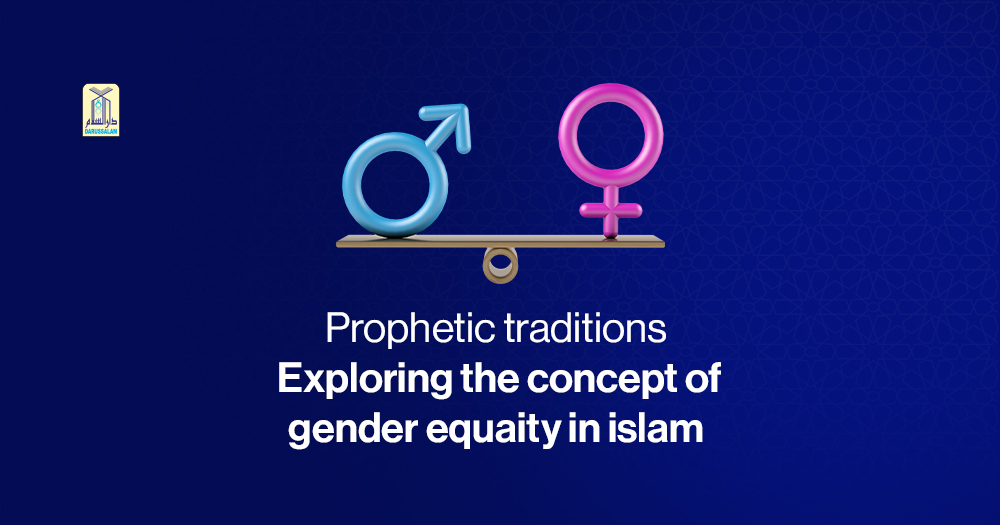Preface:
There is a great deal of propaganda in the world especially in east countries that Islam has not given equal rights to women, and also it is said that it has oppressed women by giving them fewer rights than men. Its aim is to create hatred for Islam in the hearts of people and hinder the spread of Islamic teachings.
One thing is very important to be understood that Islam is a religion of nature. All its teachings are in accordance with nature. There is not a single principle in the entire Islamic literature that is against nature. The responsibilities and rights that Islam has given to men and women are in accordance with their nature. Just as example that giving birth to a child is in the nature of a woman, Islam has also entrusted this responsibility to the woman and gave her respect as mother and a man is created strong, totally fit to work hard that a normal women could not, so his responsibility is in accordance with his nature to work hard and earn for his family. This division of Islam is called “justice”.
Islam has given men and women the rights and responsibilities with justice that were easy for them to fulfill. Indeed, the Messenger of Allah PBUH said:
Every one of you is a guardian and every one of you is responsible (for his wards). A ruler is a guardian and is responsible (for his subjects); a man is a guardian of his family and responsible (for them); a wife is a guardian of her husband’s house and she is responsible (for it), a slave is a guardian of his master’s property and is responsible (for that). Beware! All of you are guardians and are responsible. (Sahih Bukhari: 2409)
This hadith makes it clear that Allah Almighty has given every person rights and responsibilities according to their capabilities. For example, a woman is capable of managing her husband’s home; she is mentioned as the guardian of her husband’s home. A man has to take care of his entire household; he is given the responsibility of managing his household. That division is called “divine justice” means assigning duties, rights and responsibilities to someone according to his nature and that person will be asked about his duty in the Day of Judgment.
The Concept of “Justice” in Islam:
There are many meanings of justice described in Islam. Islamic scholars have tried to clarify it from their own perspective. Some of the meanings are as follows:
Justice is derived from the Arabic words “Ain.dal.lam (ع۔ د۔ل)” which means equality, as maintaining equality between two things is called justice. ((Lisan al-Arab)) by Ibn Manzur (11/430).
The meaning of the term justice is quite broad, which scholars have explained in their own words. Thus, Ibn Hazm, while defining it, says:
The meaning of justice is that you pay the rights of others on your behalf and receive your rights from others. (Al-Akhlaq wasseyar Ibn e Hazam,page:81)
Allama Ibn Uthaymeen, while defining the word “justice”, says:
“Justice means giving everything the place it deserves.” (Tafseer Ibn e Uthaimeen:3/80)
A very good Islamic scholar, Allama Ibn Jahiz, has explained the meaning of “justice” as follows:
Using matters in their times and places, in their quantities and reasons, in such a way that there is neither excess nor deficiency in them, nor is there any advance or delay in time. (Tahzeeb ul Akhlaq Ibn e Jahaz, page:28)
From all the above lines, it is clear that the meaning of justice is that a person should subject his life to the Islamic teachings. Means as much as the Sharia has ordered to be given rights and duties to someone, he should be given that much, and what the Sharia has forbidden, should be stopped immediately.
Important Note:
It is very important to understand that Islamic law has given equal rights and responsibilities to women and men in many matters, while in some matters it has differentiated their rights and responsibilities just due to Allah’s wisdom and judgment. The following is a detailed discussion of the matters in which the rights and duties of men and women are equal and in which matters Islam has made some exceptions.
The rights in which men and women are same:
1. Equality in Creation and Spiritual Status:
Allah Almighty did not differentiate between the creation of men and women. There is not a single word in the entire Islamic literature that suggests that Allah Almighty has described the creation of women as inferior to the creation of men. Rather, a deep study of Islamic literature will reveal that in many matters women have been given more respect than men as appears from this Hadith. Abu Huraira reported that a person came to Allah’s Messenger PBUH and said: Who among the people is most deserving of a fine treatment from my hand? He said: Your mother. He again said: Then who (is the next one)? He said: Again it is your mother (who deserves the best treatment from you). He said: Then who (is the next one)? He (the Holy Prophet) said: Again, it is your mother. He (again) said: Then who? Thereupon he said: Then it is your father. (Sahih Muslim:2548)
2. Equality in Spiritual Rewards and Responsibilities:
Allah Almighty has made women and men equal in worship. If a man receives a good deed in return for a good deed, then a woman also receives the same amount of good deed. Allah Almighty said:
فَاسْتَجَابَ لَهُمْ رَبُّهُمْ أَنِّي لَا أُضِيعُ عَمَلَ عَامِلٍ مِنْكُمْ مِنْ ذَكَرٍ أَوْ أُنْثَى بَعْضُكُمْ مِنْ بَعْضٍ فَالَّذِينَ هَاجَرُوا وَأُخْرِجُوا مِنْ دِيَارِهِمْ وَأُوذُوا فِي سَبِيلِي وَقَاتَلُوا وَقُتِلُوا لَأُكَفِّرَنَّ عَنْهُمْ سَيِّئَاتِهِمْ وَلَأُدْخِلَنَّهُمْ جَنَّاتٍ تَجْرِي مِنْ تَحْتِهَا الْأَنْهَارُ ثَوَابًا مِنْ عِنْدِ اللَّهِ وَاللَّهُ عِنْدَهُ حُسْنُ الثَّوَابِ
And their Lord responded to them, “Never will I allow to be lost the work of [any] worker among you, whether male or female; you are of one another. So those who emigrated or were evicted from their homes or were harmed in My cause or fought or were killed – I will surely remove from them their misdeeds, and I will surely admit them to gardens beneath which rivers flow as reward from Allah, and Allah has with Him the best reward.(Surah A’al e Imran: 195)
Allah almighty said in Surah A’al e Imran:
And whosever does righteous deeds, whether male and female, while being a believer – those will enter Paradise and will not be wronged, [even as much as] the speck on a date seed. (Surah A’ale Imran:124)
This means that men and women are given equal rights in earning good deeds; the more one worships Allah, the greater the reward he will receive.
3. Rights to Education and Knowledge:
Allah Almighty has said that the most honorable of all people in this world and the Hereafter are those who acquire knowledge. Rather, the Messenger of Allah PBUH has declared scholars to be the heirs of the prophets. The Messenger of Allah PBUH says:
The learned are the heirs of the prophets who leave neither dinar nor dirham, leaving only knowledge, and he who accepts it accepts an abundant portion. (Sunan Abi Dawood:212)
There is no distinction between men and women in acquiring knowledge. Rather, it is permissible for either of them to acquire as much knowledge as they wish in the context of Islamic teachings. In fact, Islam has made the acquisition of knowledge obligatory for both men and women. The Messenger of Allah PBUH said:
The best among you (Muslims men and women) are those who learn the Qur’an and teach it. (Sahih Bukhari: 5027)
Also the Prophet PBUH said:
Seeking knowledge is a duty upon every Muslim (men or women). (Sunan Ibn e Majah:224)
Rather, Islam encourages marrying a woman with having Islamic knowledge. The Messenger of Allah PBUH said: Women may be married for four reasons: for her property, her ranks, her beauty and her religiosity. So get the one who is religious and prosper. (5027)
4. Economic Rights and Financial Independence:
In Islam, men and women are granted equal economic rights, including the ability to earn, own property, and make financial decisions. The Quran states,
لِلرِّجَالِ نَصِيبٌ مِمَّا اكْتَسَبُوا وَلِلنِّسَاءِ نَصِيبٌ مِمَّا اكْتَسَبْنَ
For men is a share of what they have earned, and for women is a share of what they have earned. (4:32),
That shows that both genders have the right to engage in economic activities and enjoy financial independence. Women in Islam have the right to own property, inherit wealth, and manage their finances without interference. The Prophet Muhammad (PBUH) recognized the financial independence of women, praising successful women like Khadijah (RA), who was a prosperous businesswoman.
Women also have the right to keep their earnings, and the dowry in the shape of Mahr is solely their property. Additionally, the Quran emphasizes fair treatment in financial matters, stating:
Do not take each other’s property unjustly” (Surah Baqrah:188).
Islam ensures that both men and women have equal opportunities for economic self-sufficiency, promoting justice and equality in financial matters.
5. Marriage: Partnership and Mutual Rights:
In Islam, marriage is seen as a partnership where both men and women have equal rights and responsibilities. The Quran emphasizes mutual respect and cooperation between spouses, stating:
وَلَهُنَّ مِثْلُ الَّذِي عَلَيْهِنَّ بِالْمَعْرُوفِ
And due to the wives is similar to what is expected of them, according to what is reasonable. (Surah Baqrah:228)
This shows that both partners share equal rights in the marriage. The Prophet Muhammad (PBUH) said,
خَيْرُكُمْ خَيْرُكُمْ لِأَهْلِهِ وَأَنَا خَيْرُكُمْ لِأَهْلِي
The best of you are those who are the best to their wives. (Sunan Tirmidhi:3895),
That highlights the importance of treating each other with kindness and fairness. Both spouses have the right to fulfill their needs, and each has the right to express their opinions and seek mutual agreement in family matters. The Quran also stresses the importance of mutual respect and protection:
وَعَاشِرُوهُنَّ بِالْمَعْرُوفِ
Live with them in kindness. (Surah An’Nisa:19)
In Islam, both men and women are seen as equal partners who work together to build a harmonious and balanced life, ensuring that both are treated with dignity and fairness.
6. Right to Justice and Protection from Oppression:
According to the teaching of Islam both men and women have the equal right to justice and protection from oppression. The Quran emphasizes fairness and equality, stating:
O you, who have believed, be persistently standing firm in justice. (Surah An’Nisa: 135)
This applies to all people, regardless of gender. Islam forbids any form of oppression, and both men and women are entitled to be treated with dignity and fairness. The Prophet Muhammad (PBUH) said:
Help your brother, whether he is an oppressor or he is oppressed.(Sahih Bukhari: 2443)
That stresses that justice must prevail for everyone by preventing the oppressor from oppression and protecting the oppressed from oppression. Women are equally entitled to protection under the law, and their rights must be safeguarded. The Quran also warns against harming others unjustly:
Do not wrong yourselves. (Surah An’Nisa: 29).
Both men and women have the right to seek justice in case of mistreatment, with the Islamic system ensuring that all individuals are protected from oppression, regardless of their gender. Islam promotes a society where justice is equally available to all, ensuring that no one is oppressed or wronged.
7. Modesty and Gender Roles:
In Islam, both men and women are equal in the right to modesty and have defined gender roles that promote respect and dignity for each. The Quran teaches that both genders should maintain modesty, as seen in
Say to the believing men to lower their gaze and guard their private parts… And say to the believing women to lower their gaze and guard their private parts. (Surah An-Noor:30-31).
This shows that both men and women are required to observe modest behavior in their actions and appearance. The Prophet Muhammad (PBUH) also emphasized modesty, saying:
Modesty is part of faith. (Sahih Bukhari:5006),
That includes its importance for both genders male and female. While the roles of men and women in society may differ, both are respected in their respective roles, and Islam ensures that neither gender is demeaned. The Quran also says:
Men are the protectors and maintainers of women. (Sura An’Nisa: 34),
That highlights the responsibility of men to support and care for women, while women have a role in nurturing and managing family affairs. However, these roles are complementary and based on mutual respect, ensuring that both men and women contribute to society in their own ways with dignity and modesty.
The rights in which man and women are not same:
There are some rights and responsibilities in which men and women are not same. The reality is that if someone sees these terms deeply in the light of Islamic teaching and society behavior, he will understand that this Islamic division is totally full of justice. Here are some examples of them:
1. Inheritance:
According to the Quran, men typically receive a larger share of inheritance than women. Allah says in the Quran:
For the male, the portion equal to that of two females. (Surah An’Nisa:11).
It appears from the above verse of Quran that women are being given a smaller share of inheritance here, while the reality is that this is based on the financial responsibility of men to support their family members to fulfill their needs. While women have the right to keep their wealth in their custody and are not obligated to financially support others because this is the duty of men to bear all the expenses of their family according to their financially health. Allah says:
Men are in charge of women by [right of] what Allah has given one over the other and what they spend [for maintenance] from their wealth. (Surah An’Nisa:34)
The Prophet PBUH said: in regard to women: They (women) have rights over you (the men) to provide them with their sustenance and clothing in a reasonable manner. (Sahih Muslim:1218)
The Prophet also said that:
A man is a guardian of his family and responsible (for them). (Sahih Bukhari:893)
This division of Islam is not against women but in favor of women because if a man is taking a double share, he is also responsible for spending on the entire family. It is possible that he may spend money on his own behalf along with his inheritance share while spending on the family. Whereas women are not obligated to spend the share they receive on anything.
2. Marriage Guardianship:
In traditional Islamic law, a woman requires a male guardian (wali) to marry, while a man does not need such a guardian. The wali’s role is to ensure that the marriage is in the woman’s best interest.
Indeed in Islam, the requirement of a guardian (wali) in marriage is rooted in the wisdom of ensuring protection, fairness, and social responsibility. The Quran mentions in Surah An-Nisa verse no. 3 that marriage is a solemn contract, and it is beneficial for the woman to have a guardian who ensures her best interests are met. The guardian, typically a father or male relative, acts as a protector and adviser, guiding the woman in making a decision that aligns with her well-being and Islamic principles.
The hadith also supports this requirement, with the Prophet Muhammad PBUH stating:
“There is no marriage without a guardian” (Sunan Abu Dawood:2085).
This underscores the importance of having a responsible figure involved to ensure the marriage is conducted fairly and with due consideration. It helps to prevent coercion and protects the woman from making a rash decision that may not be in her long-term interest. The guardian’s role is not to control but to facilitate a process of consultation, where the woman’s consent is essential, but the guardian’s presence provides guidance rooted in the community’s values. Ultimately, the guardian’s role emphasizes protection, mutual respect, and the protection of rights within the Islamic marriage framework.
3. Polygamy:
Men are permitted to marry up to four wives, provided they treat them equally and justly, as stated in the Quran:
Then marry those that please you of [other] women, two or three or four But if you fear that you will not be just, then [marry only] one. (Surah An’Nisa:3).
While women are not allowed to have multiple husbands in Islamic law.
The Fact is that In Islam, polygamy is permitted for men under specific conditions to ensure justice and protection for women. The Quran addresses in Surah An’Nisa verse no.3 where it allows a man to marry up to four women, but with the condition that he treats them equally and justly. The verse further emphasizes:
But if you fear that you will not be just, then marry those that please you of [other] women. (Sura An’Nisa:3),
That highlights that the core principle is fairness. Islam restricts polygamy to men because of their role as providers and protectors, ensuring that they can support multiple families in terms of financial and emotional stability. Women, on the other hand, are not allowed multiple husbands because of the potential confusion regarding lineage and inheritance, which is central to Islamic law.
The Prophet Muhammad PBUH allowed polygamy to address societal needs, such as the protection of widows and orphans, especially in times of war. However, he also warned that it is a heavy responsibility, as he said:
Whoever has two wives and is unjust to one of them will come on the Day of Judgment with a side leaning. (Sunan Abu Dawood: 2133)
Therefore, polygamy in Islam is a limited, regulated practice aimed at justice and social welfare, rather than an unrestricted privilege.
4. Witnesses in Court:
In some legal cases, the testimony of two women is required to equal the testimony of one man. This is outlined in Quran Sura Baqrah, verse no.:282, where it mentions that for financial transactions, two women are to witness alongside one man, as women were historically less involved in business and financial matters in early Islamic society.
It is informed that with regard to the witness of two women being equal to the testimony of one man. Allah has mentioned the wisdom behind specifying the number of two as being that a woman may forget or get confused, so the other woman can remind her, as He said:
“…And get two witnesses out of your own men. And if there are not two men (available), then a man and two women, such as you agree for witnesses, so that if one of them (two women) errs, the other can remind her. [Surah All-Baqarah:282 – interpretation of the meaning]
With regard to the phrase, “that if one of them (two women) errs”, Ibn Katheer said: “This means, the two women, if one of them forgets the testimony, then ‘the other can remind her’, i.e., she can remind her about the matter concerning which testimony is being given.” (Tafseer Ibn Katheer, v. 1, p. 724)
Ibn e Qayyam says that: Allah has commanded the testimony of two women so as to be sure that they remember, because the mind and memory of two women takes the place of the mind and memory of one man. (I’laam al-Muwaqqa’een, v. 1, p. 75).
This does not mean that a woman does not understand or that she cannot remember things, but she is weaker than man in these aspects – usually. Scientific and specialized studies have shown that men’s minds are more perfect than those of women, and reality and experience bear witness to that. The books of knowledge are the best witness to that; the knowledge which has been transmitted by men and the ahadith which have been memorized by men far outnumber those which have come via women.
This has to do with gender, i.e., the gender of men is more perfect than the gender of women. Allaah says (interpretation of the meaning):
“Men are the protectors and maintainers of women, because Allaah has made one of them to excel the other, and because they spend (to support them) from their means. Therefore the righteous women are devoutly obedient (to Allaah and to their husbands), and guard in the husband’s absence what Allaah orders them to guard (e.g. their chastity and their husband’s property)” [Surah An’Nisa:34]
Conclusion:
These are some terms in which it is apparent that women have been wronged by giving men more rights than women, while the reality is that although it may seem that women have been given few rights, if we study them keeping in mind Islamic teachings and the needs of the modern era, we will know that Allah Almighty has acted with complete justice in giving each gender its rights and duties.
Therefore, it is important that we should study Islamic teachings in depth so that we understand Islam and its terms well. Here you are introduced to a very large Islamic institute that has published thousands of books on various Islamic topics. You can also benefit from these books and gain religious information.
Note: For an introduction to the most scholarly books on numerous other topics of Darussalam, just visit:





